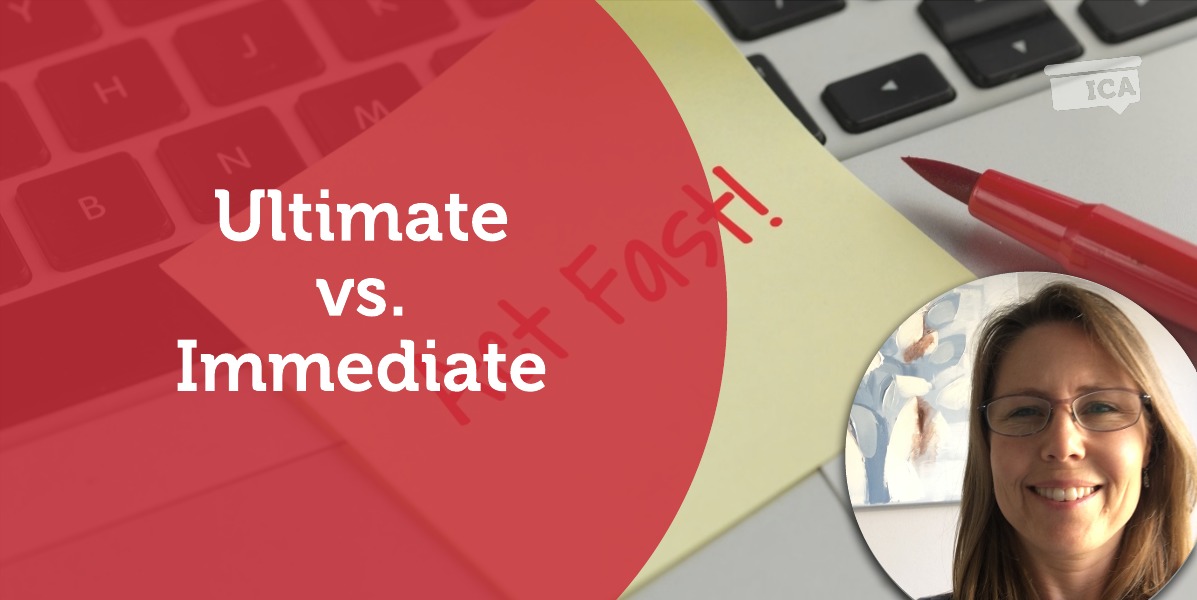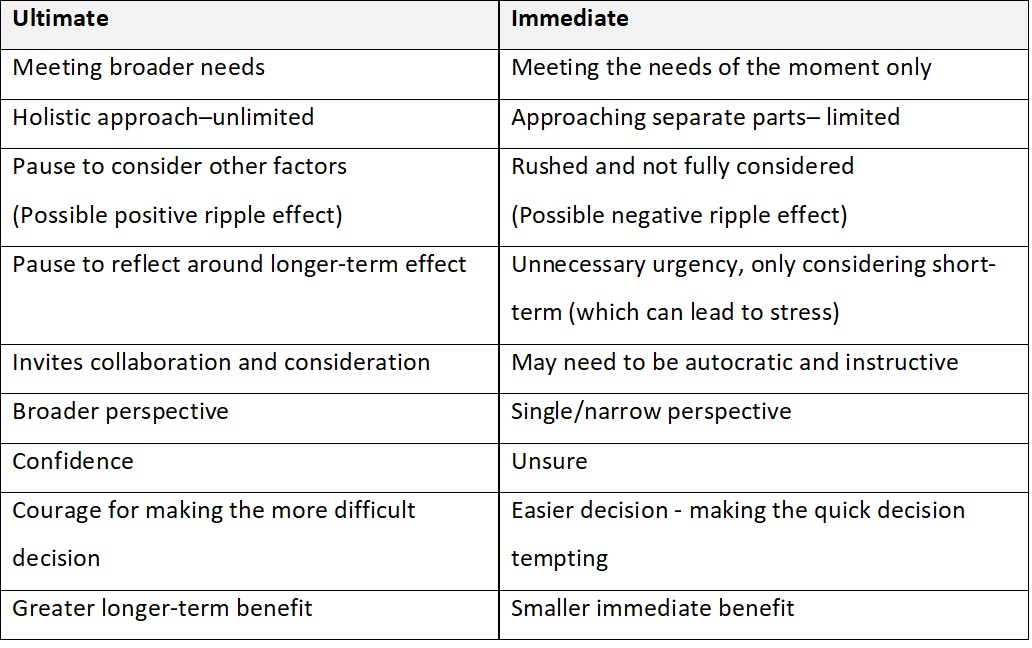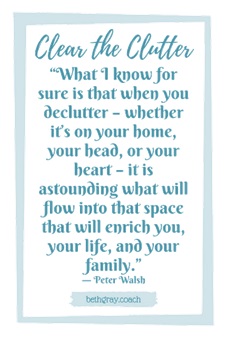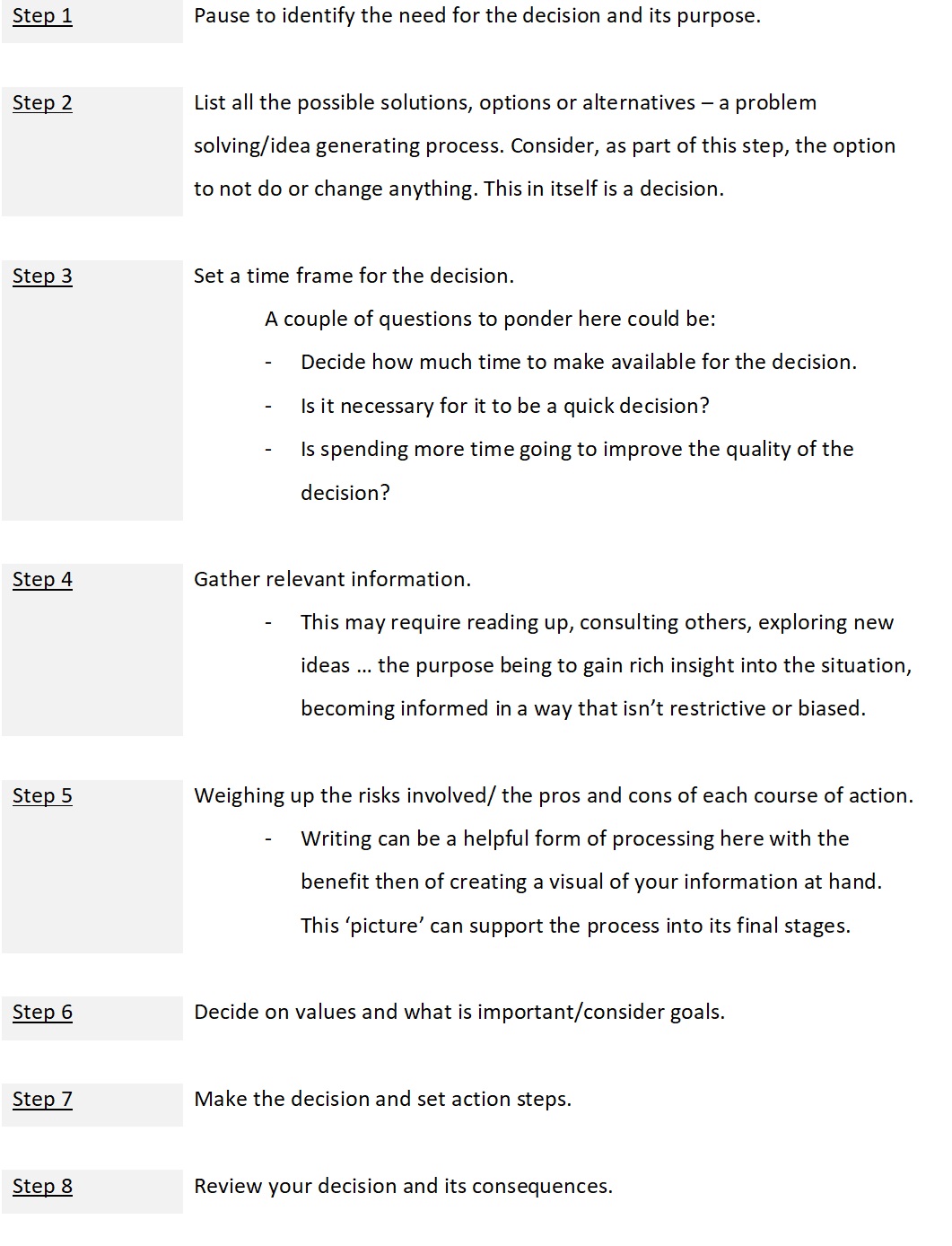 A Coaching Power Tool Created by Gretel Lampe
A Coaching Power Tool Created by Gretel Lampe
(Executive Coach, UNITED STATES)
Introduction
Finding ease and flow in our lives is an overarching goal of many. We all, however, face dilemmas or struggles along the way, and in these moments we will most likely be faced with needing to make decisions. These moments can create speedbumps for us and interrupt this desired flow. This is because, when called to make a decision, big or small, there are often many factors at play including the unknown. There is considering and understanding what goes into the process of making the decision – values, beliefs, timing, circumstances, etc, and then there is considering the consequences of the decision – the impact on goals, desires, lifestyle. Considering only limiting factors and the immediate consequences vs considering a broader range of factors as well as the longer-term consequences of the decision can play a big role in the clarity, ease, and efficacy of that decision-making process and the success of its outcome.
The shift in perspective from immediate to ultimate when considering the impact of making a decision creates the opportunity for a client to open their mind to new ways of thinking, both broader and more holistic.
There are times where decisions need to be made quickly, but most often there is actually time available to commit to making decisions. Thorough decision-making requires time for consideration, reflection, reasoning, tuning into your intuition, being creative, gathering information and input from others, among several other factors. Whether there is an urgency or not, considering the perspective of the ultimate benefit vs the immediate benefit of your decision will richly impact the decision-making process and the success and effectiveness of its outcome.
Explanation
Ultimate– understood to mean“being or happening at the end of a process
Immediate – understood to mean “occurring or done at once without a lapse of time
When considering a broader range of factors and the ultimate consequence of a decision as opposed to a limited range of factors and the consequence of a rushed decision, this ultimate thinking instantly shifts the decision-making process to a more thorough and considered approach.
The following is a table comparing the thinking and potential outcomes from the two scenarios:
 The ultimate vs immediate decision may take more time and thoroughness and may require frequent courage. Often, however, as soon as one taps into the broader range of factors and the longer-term benefits, an outcome can suddenly become a lot clearer. This process of contemplation can also be the place where courage is born to make the more difficult decision when necessary.
The ultimate vs immediate decision may take more time and thoroughness and may require frequent courage. Often, however, as soon as one taps into the broader range of factors and the longer-term benefits, an outcome can suddenly become a lot clearer. This process of contemplation can also be the place where courage is born to make the more difficult decision when necessary.
Application
Let’s have a look at how this change in perspective from immediate to ultimate can support a client when faced with needing to make a decision or wanting to consider their thoughts about a particular issue or struggle.
The encouragement to consider the longer-term effects of a decision immediately broadens the consideration and enables new thoughts to be introduced to a situation or decision. It creates a zoom-out lens, offering the client the opportunity to consider the bigger picture. So, when a client finds themselves at a crossroads, instead of making a quick decision only considering what is directly in front of them, coaching can support them to consider the longer-term effects of their decision.

Self-Application
Decision-making in its simplest form is the act of choosing between two or more courses of action.
Decisions can be made through either an intuitive or reasoned process or we can follow our hearts. The best is a combination of all three and therefore requires space, time, and intention. The clearer your head, the more attention you can offer the process.
Your intuition, also known as your ‘gut feel’, is a combination of experience and your personal values. Because your intuition reflects your learning about life, it is of value to take it into account, together with the added layer of considering why there is perhaps a strong sense for a particular course of action.
To use reason in a decision-making process is to consider the facts and figures in front of you, generally ignoring the emotional aspects of the decision.
Bringing intuition and reason together, therefore, when making a decision is powerful because you are more likely to implement a decision full-heartedly if you are emotionally committed to it. This is because emotion plays a critical role in the decision-making process. Therefore, once you’ve gathered the necessary information and feel as though you’ve reached a reasonable decision through your head and your gut, check-in with how you feel about it before finally committing. Our intuitive response will have the best chance if a thorough process is followed. Take the time.
Your intuition can also be useful to guide you as to whether you have gathered enough information or have consulted enough people. Your intuition can catch you from falling into the trap of not ever feeling like you have enough. In fact, involving too many people can become too much and be unnecessary. You can even use your gut feel to help you sift through what of your information to capture that is most important and relevant.
Your instinct may be to make a quick decision but acting in haste is not always going to produce the best results. So, don’t be tempted to act too quickly. Decision-making begins with awareness and especially self-awareness which has been beautifully captured as the capacity for introspection where you deeply understand your personal thoughts, emotions, and behavior as well as how these affect you and everyone else around you. As a first step in the process, pause! It is always worth taking a moment to consider yourself, your options, and their implications. This ensures consideration for your thoughts, feelings, and actions as well as the possible impact of these on the people around you. This skill provides you with the opportunity to think things through and to be intentional about choosing actions that have long term benefits and build rather than break down.
The art of decision-making is considered a life skill. A good decision is one that enriches you and benefits the greater good. The more you realize the responsibility for your choices lies with you, the better you will get at it.
Let’s unpack some of the aspects of this life skill when approached from an ‘ultimate’ perspective:
To be able to think creatively and with a problem-solving mindset, there ideally needs to be low levels of stress to have an open mind towards a situation. There are a couple of things you can try if you find yourself in a dilemma that doesn’t seem to have an obvious way forward.
When we use logic and reasoning to make decisions, we look to exclude emotions, using only rational thoughts and methods. Most final decisions are not made logically but logic and seeking the truth are important parts of the process. The technique of critical thinking is an intentional process and requires logical thinking and creativity, asking critical questions to uncover facts from opinions, being able to contribute reasoning, and being able to understand connections between things. It requires you to question your assumptions and enables you to deduce consequences and solve problems from the information gathered.
Your priorities should align with your goals and values and so decision-making is crucial to
time-management. It will support your planning and organizing as well as how you use the time you have allocated efficiently and effectively. Time-management is also crucial to decision-making. It is useful to establish upfront whether there is a fixed time frame on a required decision. You will then have a clear time frame within which to plan the decision-making process. Not having a fixed time frame can sometimes be tricky and may lead to procrastination. Considering the importance and purpose of the decision are perhaps critical reflections to include as well as how does delaying the decision impact you and others. It may be useful to set your own deadline when facing a decision simply to put a line in the sand, making sure you have allocated adequate time to the process. Good time-management skills enable you to be calmer and more in control and therefore increase your ability to be thorough and focused during the process, often producing better decisions as an outcome.
A collaborative approach to decision-making invites input from several sources which introduces a wider range of thinking and increased perspective and helps to eliminate bias. Once a chosen path is actioned, buy-in from those who are involved will be far higher if they’ve had the opportunity to offer input and be a part of the process.
Because no one human is all-knowing and all-seeing, a sound decision cannot be made alone.
We, therefore, need to consider the nature and quality of our interactions with others. We need to consider how we communicate –what we say, how we speak, how we listen, how we show up –as well as the energy and trust we offer and our mindset and attitude we bring. All of this impacts the effectiveness of our interaction with others. To gain new information and different perspectives we need to be open to those we consult with. The ability to make a good decision is often based on our openness to receive information. Showing up with respect and paying attention without interruption or judgment allows for interactions with others that can truly benefit the decision-making process. How you interact with those who you seek assistance from in supporting you with your decision-making process will determine the richness of the interaction.
Listening is probably one of the most crucial skills to master and practice with intention. Taking listening one step further, it is also important to get a sense of what is not being said, as well as non-verbal cues. These ‘gaps’ and cues may give you a really good sense of what someone is really thinking, feeling, or needing. This further awareness may also help you get a better sense of the bigger picture. Also, it is advisable to select key people to consult when needing to make a decision, being sure not to just find yes-people. Have the courage to be challenged on your thinking.
The most basic and powerful way to connect to another person is to listen. Just listen. Perhaps the most important thing we ever give each other is our attention.– Dr. Rachel Naomi Remen
Reflection
- Needing to make a decision while caught up in the busyness of everything, do you pause to consider the importance and the true urgency of the decision?
- Think of a situation where you were caught up in the urgency of a decision. What opportunities or factors were missed because of the need for a rushed decision?
- Consider a time when you were able to take your time over a decision. What impact did this have on the effects and benefits of the decision? Were there any unconsidered ripple effects?
Coaching Application
When faced with a decision it can often feel like an either/or situation but remember to make room for the ‘ultimate’ thinking and consider other options and new possibilities.
Good ‘ultimate’ decision-making, especially when faced with a complex situation, can benefit from a structured approach. Here are some recommended steps to consider when faced with a struggle that requires a decision:

Confidence in your final decision impacts the outcome of the chosen course of action and your thoroughness and integrity of the process contribute to this confidence.
Ultimately, the most important when facing a dilemma that requires a decision is not to rush into action but to thoroughly consider your values, your goals, and other relevant factors first and then let your intuition and your heart guide you on your right course of action. The steps mentioned above provide a solid support for a decision-making process, especially when the situation is more complex. Applying the ultimate vs immediate shift in perspective allows for more considered decision-making where you can feel more confident in the success of the outcome of your decisions.
Possible Coaching Reflections …
- What information do you think you need to make this decision?
- What matters most to you around this decision?
- What have you not yet considered around this decision?
- What thoughts around this decision have popped up that need more time or exploration?
- What will be different as a result of this decision?
- What will need to change as a result of this decision?
- What is your gut feeling telling you?
- What is your heart telling you?
- What will the impact on you be if nothing changes?
- What will the impact be on others if nothing changes?
References
https://www.skillsyouneed.com/
https://www.e-education.psu.edu/.
https://smallbusiness.chron.com/
https://www.yourleadershipmatters.ca/
https://www.appointmentplus.com/